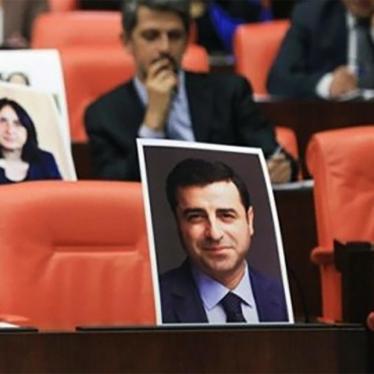(Istanbul, November 2, 2024) - Türkiye’s parliament should reject a proposed legislative amendment that seeks to expand the definition of espionage in such a vague manner that it could criminalize legitimate work by human rights defenders, journalists, and other civil society actors in the country, Human Rights Watch and the International Commission of Jurists (ICJ) said today.
Parliament is due to vote in the coming days on a draft law that includes an amendment entitled “Committing crimes against the security or political interests of the state.” The amendment adds a new article, 339A, to Türkiye’s criminal code, creating an aggravated offense of a crime against the security of the state. The amendment provides that if a crime against state security or against “its domestic or external political interests” is committed “in the strategic interests or upon the order of a foreign state or organization,” an offender can face from 3 to a potential maximum of 24 years in prison.
“The amendment would equip the government with powers to taint legitimate human rights organizations, media, and other civil society as spies or enemies of the state, discrediting and even criminalizing their work,” said Hugh Williamson, Europe and Central Asia director at Human Rights Watch. “Türkiye’s parliament should reject this vaguely-worded amendment on the grounds that it has no place in a democratic country and poses a serious risk to the exercise of free speech, association and assembly.”
Human rights, media, and other civil society groups in Türkiye have expressed strong concerns about the threat the new law poses to their legitimate work, with the risk that they will face spurious charges of espionage for foreign states or organizations.
Under Türkiye’s criminal code, the existing offenses in the chapter “Crimes against state secrets and espionage” (articles 326-339) target obtaining, destroying, or disseminating state secrets and information. The new article, 339A, does not create a standalone offense, but rather would be combined with the prosecution of another crime. Prosecution in all cases is subject to the permission of the justice minister.
The official explanatory note accompanying the amendment says that the category of “crimes against domestic or external political interests” could encompass “other interests such as economic, financial, military, national defense, public health, public security, technological, cultural, transport, communications, cyber, critical infrastructure and energy [interests],” far broader than the existing espionage offenses.
It clearly anticipates that a prosecutor, when charging a person with any number of offenses in Turkish law, potentially could also charge the person with acting in the strategic interest of a foreign power under the new article. For example, a prosecutor investigating the author of an international human rights report on suspicion of the already illegitimate charge of “insulting the president,” on the grounds that their reporting accused the president of responsibility for human rights violations, could also investigate the author on the additional charge of committing a crime “against the security or political interests of the state.”
The proposed amendment is inconsistent with Türkiye’s obligations under the European Convention on Human Rights (ECHR) and the International Covenant on Civil and Political Rights (ICCPR), in particular with respect to the rights to freedom of expression, association, and assembly. The draft article is also too vague and overbroad to meet the standards under international law of “legality.” To be valid, laws need to be sufficiently clear so that an average person can reasonably foresee the consequences of their actions and in particular when they may be in violation of the law. The draft article fails that test in many ways.
For example, the activities that might constitute “crimes against domestic or external political interests” are undefined and unforeseeable, as is the meaning of “in the strategic interests of a foreign state or organization.” The lack of foreseeability, and therefore legality, would grant huge leeway to the Turkish authorities to use the law arbitrarily against critical or independent civil society groups.
The vague wording of the article also raises the prospect that local civil society organizations or media outlets in Türkiye lawfully receiving foreign funding, and thus subject to transparent reporting and accounting requirements, could fall foul of the new law. Such groups could be accused of operating “according to the strategic interests of a foreign state or organization.”
“In view of Türkiye’s regular use of its expansive arsenal of vaguely defined laws concerning terrorism and state security to criminalize peaceful expression, assembly, and association, it is unacceptable that the Turkish government is poised to create further criminal tools to target human rights work, journalism, and other civil society activity,” said Temur Shakirov, Europe and Central Asia programme director ad interim at the International Commission of Jurists. “It is critically important that parliamentarians set to vote on this new draft understand its expansive and vague nature and reject it.”
Protecting and promoting human rights are solemn legal obligations undertaken by Türkiye and are therefore themselves necessarily in the interests of the state. Yet Türkiye has a long record of treating human rights work as hostile to purported state interests, and criminalizing work in furtherance of human rights, Human Rights Watch and the ICJ said.
If an international human rights organization's “strategic interest” is to protect human rights in all countries, including Türkiye, the new provision opens the risk that a human rights professional who criticizes the actions of the Turkish government for human rights violations could be subject to criminal charges for doing their work, a situation that both violates international law and is wholly untenable, noted the groups.








